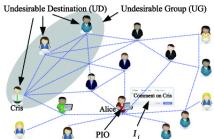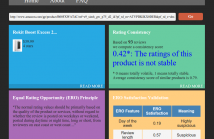
Abstract—While personal information privacy is threatened by online social networks, researchers are seeking for privacy pro- tection tools and methods to assist online social network users. In this paper, we propose a Trust-Aware Privacy Evaluation frame- work, called TAPE, aiming to address this problem. Under the TAPE framework we investigate how to quantitatively evaluate the privacy risk, as a function of people’s awarenesses of privacy risks as well as whether people can be trusted by their friends to protect others’ personal information.
document.pdf
- Categories:
 18 Views
18 Views
- Read more about EQUAL RATING OPPORTUNITY ANALYSIS FOR DETECTING REVIEW MANIPULATION (for testing)
- Log in to post comments
Abstract—Online review plays an important role when people are making decisions to purchase a product or service. It is shown that sellers can benefit from boosting their product review or downgrading their competitors’ product review. Dishonest behavior on reviews can seriously affect both buyers and sellers. In this paper, we introduce a novel angle to detect dishonest reviews, called Equal Rating Opportunity (ERO) evaluation. The proposed ERO evaluation can detect embedded manipulation signals based on limited amount of data. Experiments based on real data are conducted.
document.pdf
- Categories:
 13 Views
13 Views
- Read more about EQUAL RATING OPPORTUNITY ANALYSIS FOR DETECTING REVIEW MANIPULATION
- Log in to post comments
Abstract—Online review plays an important role when people are making decisions to purchase a product or service. It is shown that sellers can benefit from boosting their product review or downgrading their competitors’ product review. Dishonest behavior on reviews can seriously affect both buyers and sellers. In this paper, we introduce a novel angle to detect dishonest reviews, called Equal Rating Opportunity (ERO) evaluation. The proposed ERO evaluation can detect embedded manipulation signals based on limited amount of data. Experiments based on real data are conducted.
final1.pdf
- Categories:
 9 Views
9 Views
- Read more about ReviewSec: A Tool for Online Review Analysis
- Log in to post comments
Online review plays an important role when people
are making decisions to purchase a product/service. It is shown
that the sellers can benefit from boosting the reviews of their
products/services, or downgrading the reviews of their competitors.
Dishonest behavior on reviews can seriously affect both buyers
and sellers. In this work, we propose an algorithm that contains
a two-step analysis to detect whether a product’s reviews have
been manipulated. The first step is called consistency analysis,
- Categories:
 62 Views
62 ViewsPages
- « first
- ‹ previous
- 1
- 2
- 3
- 4